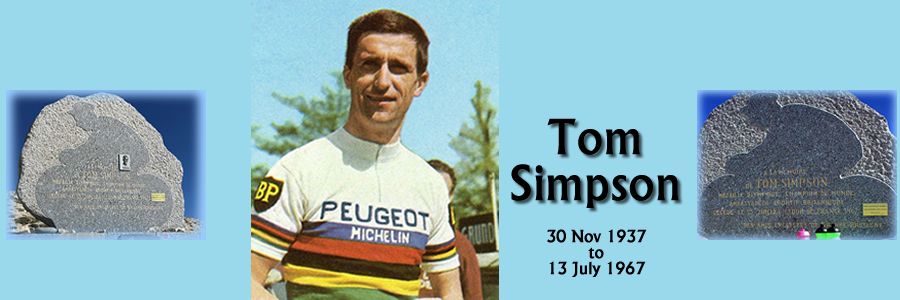50 years ago, on the 13th July 2017 one of Britain’s most successful professional cyclists collapsed and died during the ascent of Mont Ventoux, France.
Tom Simpson (30 Nov 1937 – 13 July 1967) was born is Haswell, County Durham and later moved to Haworth in Nottinghamshire.
He started Road Cycling as a teenager, before taking up Track Cycling, specialising in Pursuit Races.
He won a Bronze Medal at the 1956 Summer Olympics (Melbourne, Australia) and a Silver Medal at the 1958 British Empire & Commonwealth Game (Cardiff, Wales).
In 1959, at the age of 21, Simpson signed as a professional rider to the French road racing team Saint Raphael – R.Geminiani-Dunlop. He was quickly promoted through their ranks to the first team and in 1961 won the prestigious Tour of Flanders.
In 1962, he joined the Gitane-Leroux- R,Geminiani team, and rode the Tour de France for the first time. Simpson came in a very credible sixth place, and was the first ever British rider to wear the yellow Jersey.
In 1965 Simpson became Britain’s first Professional World Road Race Champion, and in the same year won the Giro d ’Lombardi. And he also became the BBC Sports Personality of the Year – the first cyclist to win the award.
Injuries hampered much of his 1966 season, however, he recovered, moving into 1967 with two stage wins at the Vuelta a Espana; and an overall win at the Paris-Nice race.
Simpson entered the 1967 Tour for the seventh time, now riding for the Peugeot-BP-Englebert team (with Eddy Merckx as Team Leader). The thirteenth stage, (13th July) of the Tour was 211.5kms (131.4mls); starting in Marseilles, climbing Mont Ventoux (1,909mts – 6,263ft) before finishing in Carpentras.
The weather that day was very hot, and Simpson looked tired and ill before the start.
By the time the riders were on the lower slopes, the Peloton started to split, with Simpson slipping back about a minute behind the leaders.
He than started to lose control of his bike, zig-zagging across the road. About a kilometre from the top, of the mountain, he fell off his bike. The Team Car arrived to help and tried to persuade Simpson to stop and retire from the race, but Simpson wanted to continue.
They got him back on his bike and pushed him off. Simpson rode a further 500mts before he started to wobble again, he was held upright by the spectators but he was already unconscious.
Simpson was given mouth to mouth resuscitation and a medical car arrived shortly afterwards with an oxygen mask.
About 40mins after he collapsed, a police helicopter took Simpson to the nearby Avignon hospital, where he was pronounced dead at 5:40pm.
Two empty tubes, and a half full tube of amphetamine tablets were found in the pockets of his jersey.
The official cause of death was “heart failure caused by exhaustion”. The French authorities eventually confirmed that traces of amphetamines were in his blood stream, allowing him to push himself beyond his natural limits.
Tom Simpson’s death contributed to the introduction of mandatory testing for performance enhancing drugs in cycling, leading to tests at the 1968 Giro d’Italia, the Tour de France and the Summer Olympic Games.
Unlike many of his fellow riders, Simpson was open about the use of drugs in professional cycling. One of his team mates from the time said; “Tom took a lot of chances. He took a lot of drugs”.
Another friend said; “I am quite convinced Simpson killed himself because he just did not know when to stop… he pushed it too far, perhaps the drugs easing the pain of it all”.
A granite memorial, on the site of the road where he collapsed, has become a site of pilgrimage for may cyclists, who frequently leave water bottles and cycling caps in tribute.
In 1961 Simpson had married Helen Sherburn and they had 2 daughters, Jane and Joanne, who were brought up and live in Belgium. He spoke fluent French, Flemish and Italian.
He was buried in Haworth Cemetery after a church service for some 5,000 people including his Peugeot teammate Eddy Merckx.
The words on Simpson’s memorial stone read; “His body ached, his legs grew tired, but still he would not give in”.

